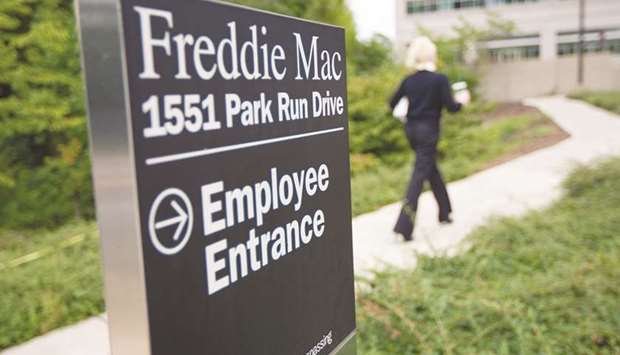President Donald Trump for the first time weighed in on reforming Fannie Mae and Freddie Mac. But his outline fell far short of an actual proposal to free the mortgage giants from US control, leaving unresolved the political challenges that have scuttled prior efforts.
The widely anticipated presidential memorandum, released by the White House on Wednesday, is best described as a plan for a plan. It calls on the Treasury Department to write a proposal for ending federal conservatorship of Fannie and Freddie and increasing competition for the companies.
Trump said the plan should include legislative and administrative fixes, indicating that Congress will have a big role. That raises doubts about Fannie and Freddie being released anytime soon because lawmakers have repeatedly failed to agree on a bill in the decade since the financial crisis.
This order “is the start of a process that we believe will be measured in years and not weeks,” Cowen & Co’s Jaret Seiberg wrote in a note to clients. “Recap and release of Fannie and Freddie does not appear imminent to us.”
Shares of Fannie rose 8.2% to $2.91 in New York trading on Wednesday, while Freddie gained 7.5% to $2.73. Deciding the fate of Fannie and Freddie, which stand behind about $5tn of home loans, is the biggest outstanding issue from the 2008 meltdown.
The companies were taken over as the housing market cratered and were bailed out with $187.5bn in taxpayer funds. They have since become profitable again, paying a combined $292.3bn in dividends to the Treasury in recent years.
The companies play a crucial role in the housing-finance system by buying mortgages from lenders, packaging the loans into bonds and then selling the securities to investors with guarantees.
Partisan Fights Topics that have triggered some of the most bitter partisan fights include what role the government should have in housing and whether Fannie and Freddie should have targets for supporting less-affluent borrowers.
Conservative Republicans want to limit the companies’ footprints, while Democrats want them to have a strong presence in underserved communities. While the US housing market is mostly functioning well, Trump’s memo nonetheless warned of serious risks if nothing is done.
“The housing finance system of the US is in urgent need of reform,” it says. “The lack of comprehensive housing-finance reform since the financial crisis has left taxpayers exposed to future bailouts.”
Key elements of the memo include ensuring that homebuyers continue to have access to 30-year-fixed rate mortgages, boosting Fannie and Freddie’s capital to protect against future losses and potentially limiting the breadth of loans the companies backstop.
The White House didn’t include a hard deadline for Treasury, other than saying it should submit a proposal “as soon as practicable.”
Specific Steps The memo lays out specific steps that must be met for the Fannie-Freddie conservatorship to end, including: That the federal government be fully compensated for any explicit or implicit guarantees it provides to Fannie and Freddie, or successor entities.
That Fannie and Freddie stick to their “core statutory mission” and that the mortgage portfolios they retain on their own books be “appropriately limited.” That Fannie and Freddie hold sufficient capital to prevent future taxpayer rescues.
The memo also calls on the Department of Housing and Urban Development to create a framework for reforming the Federal Housing Administration and Ginnie Mae, stipulating that those entities assume primary responsibility for supporting lending to low-income and first-time home buyers.
Ginnie Mae is a government owned Corp. Profit Sweep Hedge funds that own Fannie and Freddie shares have long called on policy makers to let the companies build up their capital buffers and then be released from government control.
The White House memo doesn’t specify whether the administration would pursue such a step if lawmakers fail to overhaul the companies. Lawmakers are making a renewed push at coming up with a fix, with Senate Banking Committee chairman Mike Crapo, an Idaho Republican, holding two days of hearings on Fannie and Freddie this week.
Another point of contention for private shareholders is the so-called profit sweep, a policy implemented by the Obama administration that requires Fannie and Freddie to send almost all their earnings to the Treasury. The companies are expected to send a combined $4.7bn to the Treasury before the end of the month.
Trump’s memo makes no mention of an immediate end to the sweep, likely disappointing investors who have been hopeful that his administration might soon move to halt it.

A woman walks towards a Freddie Mac office building in McLean, Virginia (file). A widely anticipated presidential memorandum, released by the White House on Wednesday calls on the Treasury Department to write a proposal for ending federal conservatorship of Fannie and Freddie and increasing competition for the companies.
